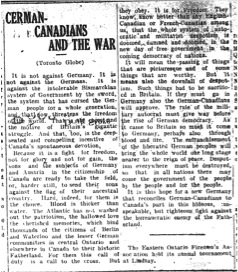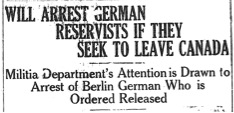On 7 August, the Berlin Daily Telegraph reprinted an article from the Toronto Globe on the presence of German-Canadians, including those in Berlin and Waterloo, during the crisis. The politically charged article stated that the war was not against Germany, or Germans, but against the Bismarckian system of government that reigned over Germany. The article stated that this government system threatened the freedom of the rest of the world and that Britain, and subsequently Canada as well, needed to stand against this threat. Britain was therefore fighting for freedom, not for glory or gain.
The article addressed the sentiment of the thousands of citizens in Berlin and Waterloo, and the smaller German communities across Ontario and Canada. Austrians and Germans with Canadian citizenship were willing to join in the fight against their ancestral countries. This did not mean that these citizens did not still love their ancestral lands. They would answer Great Britain’s call to arms because it was for freedom and because:
“They know better than an English-Canadian or French-Canadian among us, that the whole system of autocratic and militarist despotism, is doomed, damned and doomed.”
(“German-Canadians and the War,” Berlin Daily Telegraph, 6 August 1914.)

